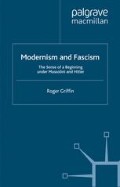Abstract
It appears, in fact, that modernist radicalism in art — the breaking down of pseudo-traditions, the making new on a true understanding of the nature of the elements of art — this radicalism involves the creation of fictions which may be dangerous in the dispositions they breed towards the world.
Access this chapter
Tax calculation will be finalised at checkout
Purchases are for personal use only
Preview
Unable to display preview. Download preview PDF.
Notes
Frank Kermode, The Sense of an Ending. Studies in the Theory of Fiction (1967) (New York: Oxford University Press, 2000), pp. 110–11.
Hayden White, ‘Historical Emplotment and the Problem of Truth’, in Saul Friedländer (ed.), Probing the Limits of Representation. Nazism and the Final Solution (Cambridge, MA: Harvard University Press, 1992), pp. 52–3.
Paul Virilio, Art and Fear (London: Continuum, 2003), pp. 29–30.
Julius Evola, Erhebung wider die moderne Weit (Stuttgart: Deutsche Verlagsanstalt, 1935)
See Mark Sedgwick, Against the Modern World. Traditionalism and the Secret Intellectual History of the Twentieth Century (Oxford: Oxford University Press, 2004).
See Julius Evola, ‘II mitoMarcuse’, Gliuominie le ravine (Rome: Volpe, 1967), pp. 263–9.
Walter Adamson, Avant-Garde Florence: From Modernism to Fascism (Cambridge, MA: Harvard University Press, 1993).
David Crowley, ‘Nationalist Modernisms’, in Christopher Wilk (ed.), Modernism 1914–1939. Designing a New World (London: V&A Publications, 2006), p. 351.
Igor Golomstock, Totalitarian Art in the Soviet Union, the Third Reich, Fascist Italy and the People’s Republic of China (London: HarperCollins, 1990).
Frederic Jameson (ed.), Aesthetics and Politics: The KeyTextsofthe Classic Debate within German Marxism. Adorno, Benjamin, Bloch, Brecht, Lukâcs. (New York: Verso, 1977).
Andrew Hewitt, Fascist Modernism: Aesthetics, Politics, and the Avant-Garde (Stanford, CA: Stanford University Press, 1993), p. 17.
Michael Ledeen, Fascism. An Informal Introduction to its Theory and Practice (New Brunswick, NJ: Transaction Books, 1976), pp. 55–7.
Peter Adam, The Arts of the Third Reich (New York: Harry N. Abrams, 1992), p. 9.
Adolf Hitler, Liberty, Art, Nationhood. Three Addresses by Adolf Hitler (published in English) (Berlin: M. Müller & Son, 1935), p. 45.
Joseph Goebbels, Michael. Ein deutsches Schicksal (Munich: Franz Eher Press, 1931), p. 124.
Henry A. Turner, ‘Fascism and Modernization’, in Henry A. Turner (ed.), Reappraisals of Fascism (New York: Franklin Watts, 1976), p. 131.
Clifford Geertz, The Interpretation of Cultures (New York: Basic Books, 1973), p. 29.
Richard Evans, In Defence of History (London: Granta Books, 2000).
Richard Fox (ed.), Recapturing Anthropology. Working in the Present (Santa Fe, NM: School of American Research Press, 1991).
Virginia Woolf, The Waves (1931) (London: Penguin, 2000), p. 183.
Julius Evola, II Cammino del Cinabro (Milan: Vanni Scheiwiller, 1972), p. 22.
Julius Evola, L ‘operaio’ nel pensiero di Ernst Jünger (Rome: Armando Armando Editore, 1960).
Copyright information
© 2007 Roger Griffin
About this chapter
Cite this chapter
Griffin, R. (2007). The Paradoxes of ‘Fascist Modernism’. In: Modernism and Fascism. Palgrave Macmillan, London. https://doi.org/10.1057/9780230596122_2
Download citation
DOI: https://doi.org/10.1057/9780230596122_2
Publisher Name: Palgrave Macmillan, London
Print ISBN: 978-1-4039-8784-6
Online ISBN: 978-0-230-59612-2
eBook Packages: Palgrave History CollectionHistory (R0)

